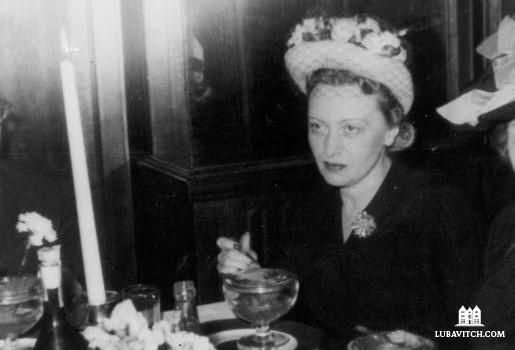Greatness comes in many forms. Often we imagine the character of a giant as someone who influences an entire world, forgetting the silent majesty of those who make such greatness possible.
Much has been said of the global achievements of the Lubavitcher Rebbe, Rabbi Menachem M. Schneerson, but little is known to the public about the life and achievements of his wife, Rebbetzin Chaya Moussia (Mushka).
On the 22nd day of the Hebrew month of Shevat, corresponding this year to Thursday, February 20, 2025, Lubavitch women around the globe commemorate the anniversary of her passing in the year 1988.
The second daughter of the sixth Lubavitcher Rebbe, Rabbi Joseph I. Schneersohn, Chaya Moussia Schneersohn descended from the bloodline of Lubavitcher Rebbes. Born in the late winter of 1901 in Babinovitch, a small Russian town located near Lubavitch, she inherited the name of her paternal great-great-grandmother, wife of the third Lubavitcher Rebbe.
Growing up in her father’s home, the young girl was witness to her father’s fearlessness against the stubborn religious intolerance of communist Russia. At a young age, she became involved in her father’s communal affairs which sometimes included dangerous missions for the underground network of Jewish educational institutions. In 1924, when she was only 23, her father entrusted her with the power of attorney, to oversee personal and institutional financial and legal matters on his behalf.
Following her father’s imprisonment in Leningrad, on charges of the Soviet crime of religious activism, Chaya Moussia followed him to exile in Kastrama where she tended to the needs of her ailing father who was battered from the torture he endured in prison.
In the autumn of 1927, religious persecution forced her father and family to flee Russia for Riga, Latvia. During the following winter of 1928, in Warsaw, Poland, she wed Rabbi Menachem M. Schneerson, who, following her father’s passing in 1950, succeeded him to become the seventh Lubavitcher Rebbe.
The young couple lived in Berlin until the rise of the Nazi regime in 1933, which forced them to flee to Paris. When German forces invaded France in 1940, they again fled to Nice in the south of the country. During this time, the Rebbetzin together with her husband aided many Jews by providing financial and other assistance, allowing them to escape almost certain death at the hands of the Nazis.
In 1941 they boarded the Serpa Pinto on which they sailed from Marseilles via Portugal to the United States of America.
After the passing of her father, she was instrumental in convincing her husband to accept the mantle of leadership of the Lubavitch movement.
In a deeply Chasidic way, she personified dignified modesty. For the wife of a world-renowned figure, she kept a very low profile and seldom appeared in public.
But the visitors she received to her home on President Street, in Brooklyn, invariably took note of her wit and wisdom that peppered her conversations, and her maternal concern for the wellbeing of others.
Rebbetzin Chaya Moussia passed away at the age of 86, on February 10, 1988. Though she passed away childless, thousands of young girls have since been named for her. These young girls, and women of Chabad at large, look to her exemplary fortitude, her commitment to Jewish life and her overall comportment as worthy of emulation.
On the day of the Rebbetzin’s passing, the Rebbe established the Keren Hachomesh Charitable Foundation (Kerenhachomesh.org) in memory of his beloved wife, a special fund to support women’s social and educational matters in fields such as Torah study, the construction of mikvahs, and the needs of brides. Today, Keren Hachomesh continues to live up to its purpose, and has helped numerous individuals and families over the past 36 years.

Inda Chaya
A very nice article about a great, beautiful, and humble woman. However the author needs to be mindful of spelling geographical names correctly, e.g the city the Previous Rebbe was sent into exile was Kostroma, although it is pronounced as Kastrama due to the reduction of vowels. The correct spelling of Rebetzin’s name is Mussya, the same as in Chaya. Mussya is a very popular Russian Jewish female name.